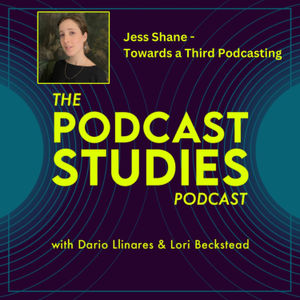
The Podcast Studies Podcast
Lori Beckstead and Dario Llinares
Jess Shane: Towards a Third Podcasting
DEC 5, 202375 MIN

Jess Shane: Towards a Third Podcasting
DEC 5, 202375 MIN
Description
<p>For this episode, Dario spoke to freelance podcast producer <a href="https://www.jessshane.com/" target="_blank" rel="noopener noreferer">Jess Shane</a>. Jess works largely in audio documentary although you can hear her work cutting across various fields, genres and themes. Jess came to our attention due an article she wrote for RadioDoc review entitled <a href="https://ro.uow.edu.au/cgi/viewcontent.cgi?article=1122&context=rdr" target="_blank" rel="noopener noreferer"><em>Towards a Third Podcasting: Activist Podcasting in the Age of Social Justice Podcasting</em></a><em>.</em> This piqued Dario’s interest, particularly because it clearly borrows from the seminal film studies article called <a href="https://www.jstor.org/stable/41685716" target="_blank" rel="noopener noreferer">Towards a Third Cinema</a>, published in 1970 by Fernando Solanas and Octavio Getino. The article has become a benchmark of film studies literature, the defining manifesto of Third Cinema which was a revolutionary movement emerging
primarily from filmmakers in Latin America but then spreading to Africa and Asia. Anti-Hollywood (first cinema) and Anti European art-house (second cinema), Third cinema is a revolutionary kind of filmmaking practice. It seeks to provoke an out and out political action and sees filmmaking as a tool for the radicalization of its audiences. Jess outlines how the Solanas and Getino piece provided inspiration for her thinking about podcasting as a call for activism, despite the very different historical, political and technological context.</p>
<p><br></p>
<p>Before even getting into detail about Third Podcasting, Jess is incredibly interesting and candid, on the topic of audio documentary. Of profound interest to her is reflecting on the ethical ambivalences in the relationship between interviewer and interviewee. She interrogates how documentary purports to manifest objectivity when reporting an issue, an event or indeed trying to give a voice to an individual. But what is often obscured is the ulterior motive of the production/producer, a way of speaking to subjects which can be erroneous, perhaps even manipulative. Producers have their own agenda, which is about the construction of the story and making an entertaining podcast, over and above the ideal of truth or giving an interviewee a platform. Jess suggests that contributors who are often looking for a psychological closure or some form of catharsis, often down know what they are getting into. We discuss two of her audio documentaries that actually play with these production ethics by highlighting the process of production in “meta” way.</p>
<p> </p>
<p>We hope you enjoy this conversation as much as we did.</p>
<p> </p>
<p><strong>Show Notes</strong></p>
<p><a href="https://www.bbc.co.uk/programmes/m001g2zn" target="_blank" rel="noopener noreferer">Accounts and Accountability</a><a href="https://soundcloud.com/iamjessshane/nicolatalkback?utm_source=clipboard&utm_campaign=wtshare&utm_medium=widget&utm_content=https%253A%252F%252Fsoundcloud.com%252Fiamjessshane%252Fnicolatalkback" target="_blank" rel="noopener noreferer">Nicola, Talkback</a></p>